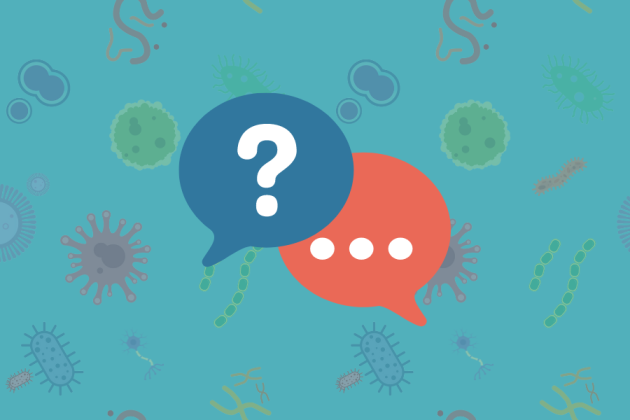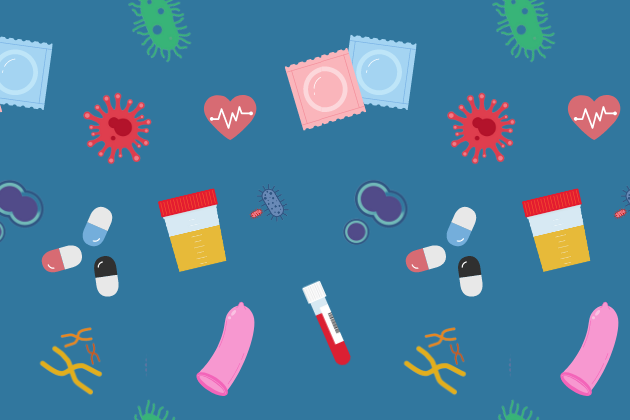
This section includes some commonly asked questions and details about the testing and results process.
What happens at an STI testing appointment?
At the health care provider’s office, you will be called into the exam room to have a brief conversation with the clinician. They might ask about your sexual history (which can include questions about the number and genders of your sexual partners), if you are currently monogamous or not, if you’ve had any STIs in the past, the types of sex you are having, whether you are using condoms and/or contraception.
These questions should be asked nonjudgmentally and shouldn’t feel invasive but some providers are better at this than others. It’s normal to feel shy or nervous about talking about sex. You can decline answering any question that feels invasive or uncomfortable. Because different tests are used to screen for different STIs, providing this information (if you are comfortable sharing it) can be helpful in narrowing down which tests are the best fit for you.
Types of STI tests
Different STIs require different types of tests. Depending on what you are being tested for, you may receive a swab, a urine test, a blood test, or a visual exam. In some circumstances, a physical examination or other type of test may be used.
Urine Tests are used to test for chlamydia and gonorrhea. Your health care provider or clinician will provide you with a small plastic container, which you will take into the bathroom and pee into. The container is then sent to a lab for testing. You will not receive your results immediately.
Swabs can be used to test for chlamydia and gonorrhea, although this is more commonly done with a urine test (as mentioned above) because urine tests are often easier or less invasive than swabs. During a swab, your health care provider will use a long Q-tip-like swab to take a small sample of fluid from either your vagina*, urethra, throat, or anus, depending on which area of your body is likely to have an STI. If you would be more comfortable collecting the sample yourself, you usually can. You will not receive your results immediately. You may be more likely to get a swab test if you’re having symptoms like discharge or if you’re also getting another exam (like a Pap test) that uses a similar method. Swabs can also be used to test for other infections like trichomoniasis or yeast infections.
Blood Tests are used to test for HIV, syphilis, and hepatitis B and C. During a blood test, a health care provider will use a small needle to take a small vial of blood from your arm. This sample is then sent to a lab for testing. You will not receive your results immediately. The only exception to this is with Rapid Point-of-Care HIV testing where a health care provider will prick your finger, take a small sample of blood, and give you your test results on the spot, usually in about 15 minutes. Not all clinics offer this type of testing so it is best to call ahead and check.
Visual exams: Sometimes, a health care provider can diagnose certain STIs by doing a visual inspection. They can diagnose things like herpes or genital warts by looking at them, if you are having an outbreak. They may also take a sample, like a swab of the fluid in a herpes sore, to send to a lab for confirmatory testing. If you are not having symptoms, you won’t be tested for things that are diagnosed with a visual exam.
Can I get tested when I am on my period?
Yes! STI tests along with physical examinations can be conducted while on your period. If you feel more comfortable waiting a day or two, that's okay too!
Is a Pap test the same thing as an STI test?
Pap tests are a preventative measure against cervical, vaginal, and anal cancers. Technically, they are not really an STI test as the health care provider is not looking for signs of a specific sexually transmitted infection; they are looking for abnormal cells on your cervix, and/or in your rectum (if you are getting an anal Pap). It’s a kind of check-in to make sure that all tissue is healthy and that there are no concerning conditions developing that should be treated.
The Pap test itself is a short procedure where a small sample of cells from your cervix is collected with a brush or spatula so that they can be examined under a microscope.
People who have a cervix and who are or have been sexually active (regardless of their gender identity, the sex of their sexual partner(s), or the type of sex they’ve had) are recommended to get regular Pap tests after specific ages. You can check with your provider to learn the current guidelines for your area.
When you get a Pap test, your health care provider may ask if you wish to be tested for STIs at the same time. In this case, they will use an additional swab to test for chlamydia and gonorrhea. It is up to you but many people find this a convenient time to get tested. If your health care provider doesn’t ask and you are interested in having an STI test while getting your Pap test done, let them know.
When do I receive my results?
The timing of when you receive your results will depend on the clinic you go to as well as the type of testing you are receiving. For instance, urine and swab tests can take around a week whereas blood tests can take two weeks or more. It’s also important to know that many clinics will not contact you if you have a negative test. If you don’t hear back from the clinic, it’s most likely that your test results have come back negative. If you’re concerned, you can call the clinic and ask them to provide your results over the phone.
The only exception to the waiting game is Rapid Point-of-Care HIV testing where you can get the result within a few minutes. Not everywhere offers this type of test, so be sure to ask the clinic if you would like to receive Rapid Point-of-Care HIV testing.
Are my results confidential?
Yes, your results are confidential but there are some limitations to this confidentiality, including reportable STBBIs and partner notification (sometimes called “contact tracing”).
When you are diagnosed with a reportable STBBI (gonorrhea, chlamydia, syphilis, HIV, and hepatitis A, B and C), the clinic where you received your positive STI test will notify the Public Health Unit in your area.
The Public Health Unit is required to try to notify any partner(s) who may have been exposed so they can also get tested and treated. A Public Health nurse may contact you and ask for the names and contact information of any current and recent partners. When they contact your partner(s), they will not use your name. They will simply let them know that they may have come into contact with a particular STI.
You can also choose to inform your partner(s) yourself instead of having Public Health contact them. Some providers will tell the public health unit that they’ve discussed partner notification with you and you are going to talk to your partner(s) yourself so that the public health nurse will not need to contact you.
If you are nervous about this process or concerned about the possible implications, your health care provider can tell you what to expect in the partner notification process and even help with suggestions on how to start having conversations with partners.
Does it cost anything?
If you have a provincial/territorial health card, STI testing is available for free. If you don’t have provincial or territorial health coverage, some clinics will provide testing services without a health card. You can check ahead of time to see if the clinic is able to provide you services without a health card. If you have provincial/territorial health coverage but don’t have the physical card (like if your parent or guardian keeps your health card with them), you may be able to get services with your health card number or a photo of the card. Check with the clinic to find out if they can offer you services without your physical card.
You can find an STI testing clinic near you by visiting our list of services near you.
What is a general STI test? How do I know what I got tested for?
If you ask to be tested for “everything” or get “a general STI test,” clinicians will often take this to mean just a urine test, which will screen for the most common bacterial STIs (chlamydia and gonorrhea).
If you want to be tested for STIs other than chlamydia and gonorrhea, it can be helpful to be prepared with information about which test(s) you would like to get or which STIs you may be concerned about.
I got tested during my last Pap test. Does that mean I got tested for everything?
If you opted to get tested during your last Pap test, unless you specifically requested additional bloodwork, chances are you were swabbed for chlamydia and gonorrhea only, in addition to cervical changes, which the Pap test is mainly intended to look for. This means you were not tested for any of the STBBIs that require blood work – for instance, HIV and syphilis. To find out for sure what you got tested for, check with your provider. If you’d like to get tested for these STBBIs as well, let your health care provider know.
Is it normal to feel anxious?
Feeling anxious before a test is totally normal and common, especially if it’s your first time or if you’re especially worried about getting a positive result. To help, some people like to prepare a few notes on what to ask for beforehand. You can also call the clinic ahead of time and ask what you can expect, or even ask for a clinic tour.
It is also very common to feel anxious even after you’ve been tested and have gotten a negative test result. If you can’t stop worrying about having an STI, even after a negative test, a sexual health clinic may offer resources like someone to talk to about how you’re feeling to help manage this worry.
My Health Care Provider Told Me I Didn’t Need To Get Tested.
It can be hard to ask your health care provider for STI testing. Being denied a service or told that it doesn’t apply to you can feel extremely disempowering. You have a right to STI testing! You have a right to health and to information.
If you’d like to find another health care provider to try again, you can find a sexual health clinic in your area through our clinic listing, or call or text our Access Line to find a sexual health clinic or other relevant services in your area.
* Not everyone uses these words for their body parts or relates to them in the same way. We have used these words as they are commonly known and encourage you to use the language that feels best for you.


